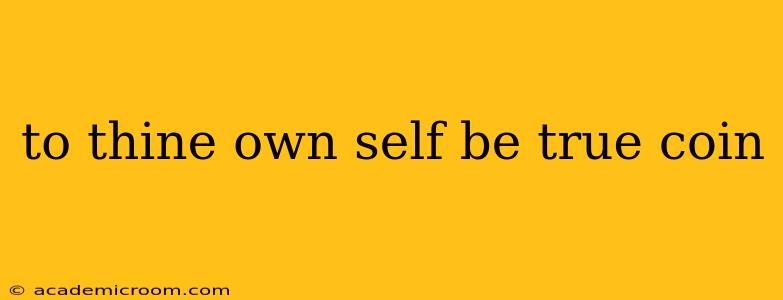To Thine Own Self Be True: Unpacking Shakespeare's Timeless Wisdom
The phrase "To thine own self be true," a line from Shakespeare's Hamlet, resonates across centuries, offering profound advice on authenticity and self-acceptance. While seemingly simple, this maxim holds layers of meaning that continue to inspire self-reflection and personal growth. This exploration delves into the meaning, application, and enduring relevance of this iconic quote.
What does "To thine own self be true" actually mean?
At its core, "To thine own self be true" advocates for living in accordance with one's genuine values, beliefs, and desires. It's a call to honesty—honesty with oneself, first and foremost. This involves understanding your strengths and weaknesses, acknowledging your feelings, and acting in alignment with your authentic self, even when it's challenging. It's not about selfishness, but rather about self-respect and integrity. It's about recognizing your inner compass and following its guidance, irrespective of external pressures.
How can I be true to myself in a world that often pressures conformity?
Navigating societal expectations while remaining true to oneself is a constant struggle. External pressures—from family, friends, societal norms, and even professional demands—can often lead individuals to compromise their values and beliefs. To counteract this, intentional self-reflection is crucial. Ask yourself:
- What truly matters to me? Identify your core values and prioritize them in your decision-making process.
- What brings me joy and fulfillment? Pursue activities and relationships that align with your passions and sense of purpose.
- What are my boundaries? Learning to set healthy boundaries is vital in protecting your well-being and preventing others from compromising your values.
- Am I living authentically? Regularly assess your actions and choices to ensure they are consistent with your inner compass.
Is being true to yourself always easy?
Absolutely not. Being true to yourself often requires courage, resilience, and a willingness to confront difficult truths about yourself and your circumstances. It might involve making tough choices that clash with expectations, facing criticism, or even experiencing temporary discomfort. But the long-term rewards of authenticity far outweigh any short-term challenges. A life lived in accordance with one's true self is often characterized by greater contentment, purpose, and inner peace.
What are the consequences of not being true to yourself?
Ignoring your inner voice and persistently compromising your values can lead to a range of negative consequences, including:
- Resentment and dissatisfaction: Continuously suppressing your true self can breed resentment and a deep sense of unhappiness.
- Anxiety and depression: Living a life that contradicts your authentic self can contribute to feelings of anxiety, depression, and a general lack of well-being.
- Damaged relationships: Inauthenticity can strain relationships, as it breeds distrust and prevents genuine connection.
- Lack of fulfillment: Without living in alignment with your values, it’s difficult to achieve a sense of purpose and fulfillment in life.
How can I incorporate “To thine own self be true” into my daily life?
The integration of this wisdom into daily life is a journey, not a destination. Small, consistent steps can make a significant difference:
- Practice self-reflection: Regularly engage in introspection, journaling, or meditation to better understand your thoughts, feelings, and values.
- Set boundaries: Learn to say "no" to requests and situations that compromise your values or well-being.
- Seek supportive relationships: Surround yourself with individuals who accept and encourage your authenticity.
- Embrace your imperfections: Accept yourself completely, flaws and all, recognizing that perfection is an illusion.
In conclusion, Shakespeare's timeless advice, "To thine own self be true," remains remarkably relevant in today's world. Embracing authenticity requires courage and self-awareness, but the rewards—a life lived with purpose, integrity, and inner peace—are immeasurable. The journey towards self-discovery and authenticity is a continuous process, demanding consistent self-reflection and a commitment to living in accordance with one's deepest values. It's a journey well worth undertaking.
